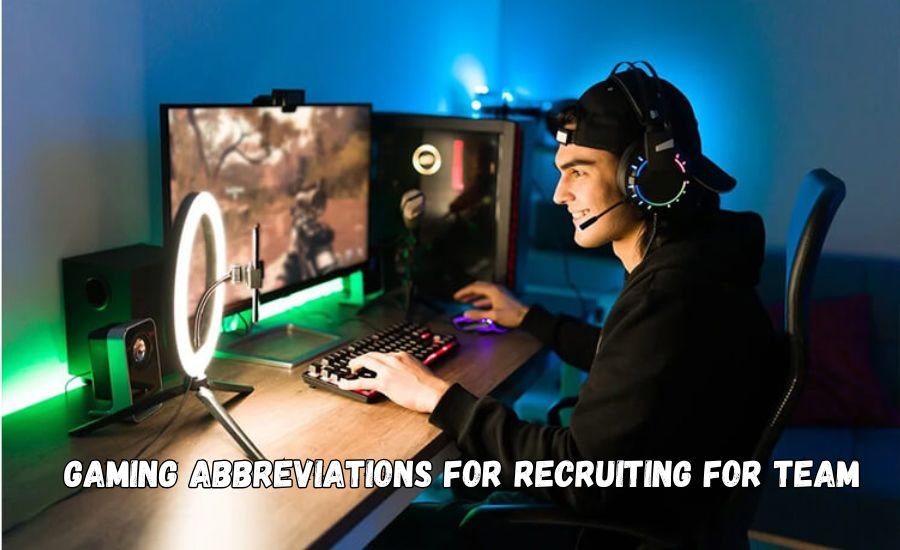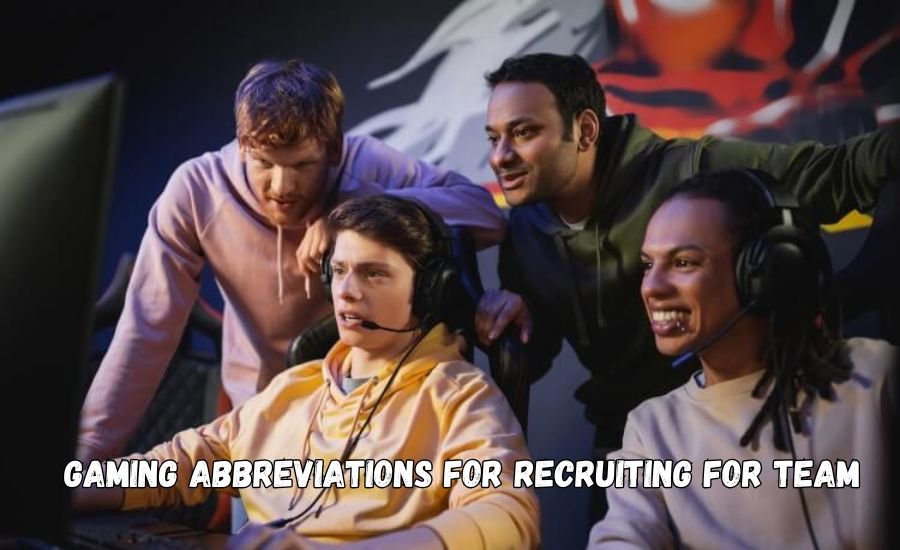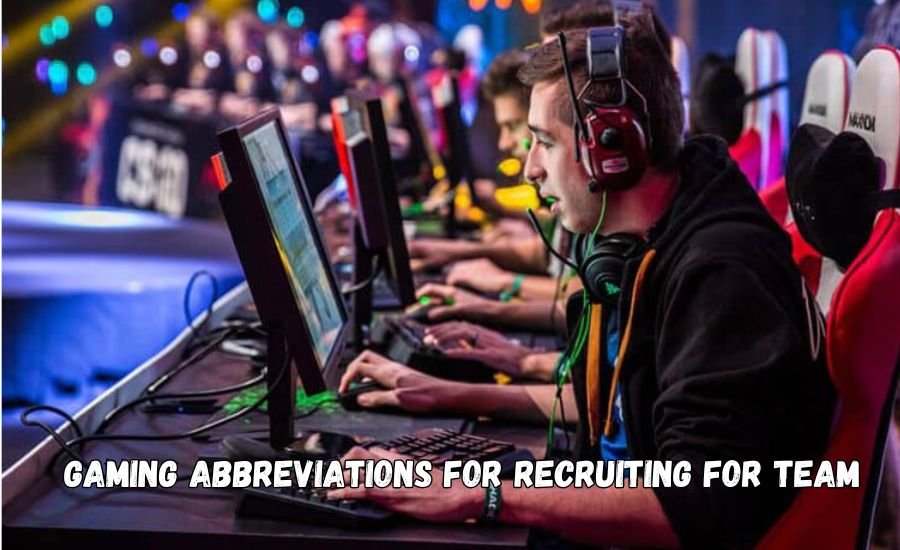In the fast-paced world of gaming, understanding the unique language spoken by gamers is crucial, especially when it comes to recruiting team members. Whether you’re building a professional esports team, a casual gaming group, or recruiting for roles in gaming companies, knowing the gaming abbreviations and slang terms can make your communication smoother and more effective. This article will dive deep into the most important gaming abbreviations, explain their meanings, and show how mastering this terminology can give you a competitive edge in team recruitment.
Why Understanding Gaming Abbreviations Is Important for Team Recruitment
Recruiting gamers is not the same as hiring for traditional jobs. The gaming culture is filled with specific terminology, much of which consists of abbreviations and acronyms. Familiarizing yourself with these terms can help you connect with potential recruits, show that you understand their world, and create an inviting environment for new team members. It also makes the recruitment process more efficient because you’re speaking the same language as the people you’re trying to hire.
Let’s explore why mastering gaming abbreviations is critical for successful team recruitment:
- Cultural Fit: When recruiting team members, especially for gaming roles, cultural fit is important. Using the correct abbreviations shows that you are aligned with the gaming community, making candidates feel more comfortable and engaged.
- Effective Communication: Clear and quick communication is vital in the gaming world. Using gaming abbreviations like “GG” (Good Game) or “AFK” (Away From Keyboard) helps save time and ensures everyone is on the same page.
- Team Cohesion: A team that speaks the same gaming language is likely to have better coordination and teamwork. When everyone understands terms like “LFG” (Looking for Group) or “DPS” (Damage Per Second), it fosters smoother gameplay and better teamwork.
Essential Gaming Abbreviations Every Recruiter Should Know

Here are some of the most commonly used gaming abbreviations that you should familiarize yourself with to recruit effectively for gaming teams:
General Abbreviations
- AFK (Away From Keyboard): Used to indicate that a player is temporarily unavailable. In recruitment, you can use this term to check a candidate’s responsiveness or understanding of team dynamics.
- GG (Good Game): A polite way to conclude a match. Candidates who use “GG” demonstrate good sportsmanship, which is essential for team cohesion.
- LFG (Looking for Group): This term is used by gamers who are seeking teammates for cooperative play. In recruitment, understanding this term can help you identify candidates who are team-oriented and eager to collaborate.
- LFP (Looking for Party): Similar to LFG but often used to indicate a preference for smaller teams.
- XP (Experience Points): Points earned through gameplay to level up characters. Understanding XP is vital when recruiting for gaming roles where progression and performance are key aspects.
Game Types Abbreviations
- RPG (Role-Playing Game): Players assume the roles of characters in a fictional setting. RPG games are popular for fostering strategy and teamwork.
- FPS (First-Person Shooter): A game genre focused on shooting from the player’s perspective. FPS games often require excellent coordination and quick reflexes, which are valuable traits in team recruits.
- MMORPG (Massively Multiplayer Online Role-Playing Game): A genre of role-playing video games where many players interact in a virtual world. MMORPG players are typically experienced in team dynamics and long-term collaboration.
Gameplay Terms Abbreviations
- PvP (Player vs Player): A gameplay mode where players compete against each other. Candidates familiar with PvP modes are usually competitive and skilled in individual performance.
- PvE (Player vs Environment): A gameplay mode where players compete against computer-controlled characters. Understanding PvE helps assess a candidate’s ability to cooperate with a team to defeat AI-controlled enemies.
- DLC (Downloadable Content): Additional content that can be downloaded after a game’s release. Candidates who regularly use DLCs are likely to stay updated with the latest gaming trends.
Communication Abbreviations
- WTT (Want To Trade): Used when players want to exchange in-game items. This term shows a candidate’s familiarity with trading dynamics, an important aspect in many MMORPGs.
- OMW (On My Way): Indicates that a player is heading to assist teammates. Candidates who use “OMW” demonstrate a team-focused mindset.
- BRB (Be Right Back): Similar to AFK, this term is used to indicate a short break from the game.
Common Player Roles
- IGL (In-Game Leader): The team member responsible for making strategic decisions during gameplay. Recruiting an IGL is critical for leading a cohesive team, as this role requires both tactical knowledge and communication skills.
- ADC (Attack Damage Carry): A key role in multiplayer online battle arenas (MOBAs) like League of Legends, focusing on high damage output. Identifying ADC players is crucial for building a well-balanced team.
- Tank: A character designed to absorb damage and protect other team members. Tanks are vital in team play, as they allow damage dealers to operate effectively without getting overwhelmed by opponents.
- Healer: A support role that specializes in restoring health to teammates. A good healer can sustain a team in prolonged fights and significantly increase the team’s chances of winning.
- Support: A role that provides utility, buffs, and vision control to enhance team performance. A strong support player ensures that the team functions smoothly.
How Gaming Abbreviations Streamline Recruitment
Now that you’re familiar with the most important gaming abbreviations, let’s explore how they can streamline the recruitment process:
1. Faster Communication
Using abbreviations like “AFK” or “LFG” in job descriptions or recruitment advertisements allows you to convey messages quickly and effectively. For example, if you’re looking for a team player for an esports squad, using terms like “LFG” or “ADC” can immediately catch the attention of qualified candidates.
2. Clear Role Definitions
When you’re recruiting for specific roles, using terms like “DPS,” “IGL,” or “Tank” clearly defines what you’re looking for. This minimizes confusion and helps candidates self-assess their fit for the role.
3. Effective Team Integration
Candidates familiar with gaming abbreviations are more likely to integrate into existing teams quickly. When everyone understands terms like “GG,” “OMW,” or “PvP,” communication becomes more fluid, leading to better collaboration and teamwork.
4. Enhanced Cultural Fit
By using gaming language in recruitment, you’re more likely to attract candidates who are deeply embedded in the gaming culture. This ensures a better cultural fit, as the candidates will be familiar with the same communication styles, making them easier to onboard.
Recruitment Strategies Using Gaming Abbreviations

To ensure your recruitment efforts are successful, here are some strategies that use gaming abbreviations effectively:
1. Use Gaming Jargon in Job Descriptions
When writing job ads, incorporate gaming terms that your target audience will understand. For instance:
- “Looking for an experienced ADC to join our competitive esports team.”
- “We need a DPS expert for our growing gaming squad!”
Using these terms makes your ad more relatable and engaging for gaming candidates.
2. Assess Familiarity During Interviews
During the interview process, ask candidates about their favorite games or gaming experiences. Listen for their use of relevant abbreviations like “GG,” “PvP,” or “ADC” to gauge their familiarity with the gaming culture.
3. Test Knowledge Through Scenario-Based Questions
Pose scenarios that require candidates to use gaming terms. For example, ask how they would handle a situation where a team member goes “AFK” during a match, or how they would coordinate a team fight as an IGL.
4. Highlight Team Roles Using Gaming Terms
When discussing team roles with candidates, use terms like “Tank,” “Support,” and “ADC” to clarify responsibilities. This helps candidates understand the structure of the team and their potential role within it.
The Benefits of Using Gaming Abbreviations in Recruitment
There are several benefits to using gaming abbreviations in your recruitment process:
- Improved Communication: Shortened terms make communication quicker and more efficient, which is essential in fast-paced gaming environments.
- Better Cultural Fit: Candidates who are familiar with gaming terms are more likely to fit in with the team culture, making onboarding smoother.
- Enhanced Recruitment Efficiency: Using relevant abbreviations helps attract candidates who are already familiar with the gaming industry, reducing the need for extensive training.
- Clear Role Definitions: Gaming abbreviations allow you to define roles clearly and concisely, making it easier for candidates to understand expectations.
Conclusion
Mastering gaming abbreviations is a powerful tool for recruiting top talent for your gaming team. By understanding and using the right terminology, you not only make the recruitment process smoother but also ensure that your team members fit into the gaming culture effortlessly. Whether you’re looking for an IGL, ADC, or DPS expert, these abbreviations help you identify the right talent, streamline communication, and foster a strong, cohesive team.
By carefully incorporating the keyword “gaming abbreviations for recruiting for team” into your recruitment strategies, you can stay ahead of your competitors and build a team that understands the nuances of the gaming world.
This comprehensive guide is your first step toward mastering the language of gaming, ensuring that your recruitment process is as efficient and effective as possible.
FAQs:
Q: What does “AFK” mean in gaming?
A: “AFK” stands for “Away From Keyboard,” indicating a player is temporarily unavailable.
Q: How can using gaming abbreviations help in team recruitment?
A: Gaming abbreviations streamline communication and show cultural fit, making the recruitment process more efficient.
Q: What does “ADC” stand for in team roles?
A: “ADC” means “Attack Damage Carry,” a role focused on dealing high damage, usually from a distance.
Q: Why is “GG” commonly used in gaming?
A: “GG” stands for “Good Game” and is a polite way to conclude a match, demonstrating good sportsmanship.
Q: What is the difference between PvP and PvE?
A: PvP stands for “Player vs Player,” while PvE means “Player vs Environment,” where players face computer-controlled opponents.
Stay informed with the latest news and updates on Techi Boomb
